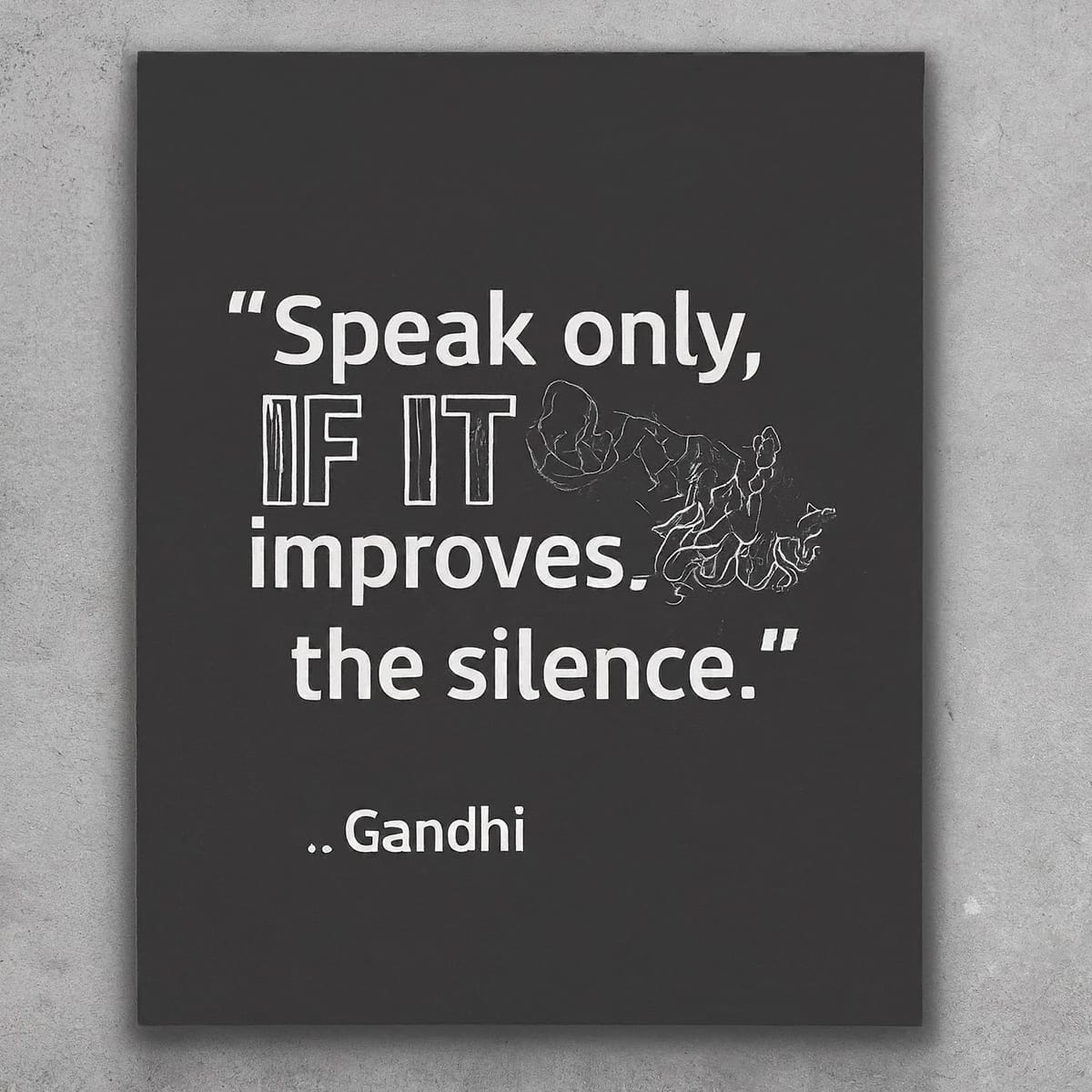Speak Only If It Improves Upon the Silence: Leadership Lessons from Jeff Bezos and Gandhi

Gandhi once said, "Speak only if it improves upon the silence." This profound insight into the power of thoughtful communication is echoed in Jeff Bezos' approach to leadership. Bezos, known for his innovative thinking and transformative leadership at Amazon, offers valuable lessons on fostering open dialogue and inclusive decision-making within teams.
The Power of Listening First
One of Bezos' key strategies is to always speak last in meetings. By allowing others to voice their opinions first, he ensures that all perspectives are heard without his views influencing their thoughts. As he noted in an interview, "If I speak first, even very strong-willed, highly intelligent, high-judgment participants in that meeting will wonder, 'Well, if Jeff thinks that, I came in this meeting thinking one thing, but maybe I'm not right'"
Creating a Culture of Truth-Telling
For any high-performing organization, truth-telling is crucial. Bezos emphasizes the need for a culture that supports honest feedback, even when it's uncomfortable. "Any high-performing organization has to have mechanisms and a culture that supports truth-telling. One of the things you have to do is you have to talk about that. You have to talk about the fact that it takes energy to do that"
Empowering All Voices
Bezos also highlights the importance of empowering junior team members. In meetings, he encourages the most junior person to speak first, followed by others in order of seniority. This practice ensures that the discussion is not biased by hierarchy and that fresh, innovative ideas come to the forefront
Balancing Data and Intuition
While data is critical, Bezos recognizes the value of intuition and anecdotes in decision-making. "A lot of our most powerful truths turn out to be hunches, they turn out to be based on anecdotes, they’re intuition-based. Sometimes you don’t even have strong data" Balancing these elements allows for more comprehensive and nuanced decisions.
Combating Bias
Recognizing inherent biases, such as the optimism bias, is essential for accurate decision-making. Bezos suggests critically evaluating both positive and negative interpretations of data to ensure balanced judgments
Practical Tips for Leaders
- Listen First, Speak Last: Encourage more candid and diverse ideas by letting others speak first. This practice prevents your opinions from stifling others' input.
- Promote a Culture of Truth-Telling: Be explicit about the importance of uncomfortable truths. Regularly remind your team that their honest input is valued, even if it’s challenging to hear.
- Empower Junior Team Members: Give the most junior members the floor first in meetings. This ensures all voices are heard and demonstrates that hierarchy does not overshadow the value of good ideas.
- Value Data and Intuition: Use intuition as a hypothesis generator. When gut feelings contradict data, delve deeper and seek additional information to validate or refute your intuition.
- Fight Inherent Biases: Actively seek to counteract biases by encouraging diverse viewpoints and critically evaluating all data.
Conclusion
Incorporating these practices can help leaders create a more inclusive, innovative, and effective team environment. It’s not just about hearing what people say but truly understanding and considering their perspectives before making decisions. By speaking only if it improves upon the silence, leaders can foster a culture of open dialogue, truth-telling, and balanced decision-making.
Q&A Section:
Q1: How can I ensure my team feels comfortable sharing their honest opinions?
A1: Establish clear communication norms that value and protect truth-telling. Regularly remind your team that their honest input is crucial and appreciated. Lead by example by showing openness to feedback and demonstrating that differing opinions are valued.
Q2: What if my intuition conflicts with the data?
A2: Use intuition as a hypothesis generator. When your gut feeling contradicts the data, it’s an opportunity to delve deeper. Re-examine the data and seek additional information to either validate or refute your intuition. This approach ensures a thorough and balanced decision-making process.
Q3: How can I overcome biases in decision-making?
A3: Be aware of common biases and actively seek to counteract them. Encourage diverse viewpoints, critically evaluate all data, and consider both positive and negative scenarios. This helps in making more balanced and less biased decisions.
Adopting these principles can significantly enhance your leadership effectiveness, fostering a culture of openness, innovation, and trust within your team.




